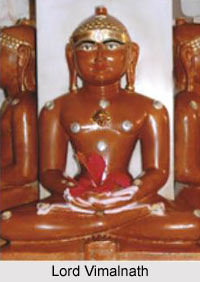 Lord Vimalnath was the thirteenth Jain Tirthankara of the current age, Avasarpini. As per Jain philosophy, he became a Siddha, an enlightened soul which has demolished all of its karma.
Lord Vimalnath was the thirteenth Jain Tirthankara of the current age, Avasarpini. As per Jain philosophy, he became a Siddha, an enlightened soul which has demolished all of its karma.
Lord Vimalnath was born to Emperor Kratvarm Raja and Queen Shyama Devi at Kampilaji in Ikshvaku dynasty. He was born on the third day of the Magh Sukla month of the Hindu calendar. Emperor Kritvarma and Queen Shyanan Devi of Kampilpur were both religious people and ardent devotees of the Jin. One day the queen dreamt of fourteen propitious things. The augurs also announced that she will give birth to a Tirthankara. The pious soul in her womb was in its earlier birth, Emperor Padmasen of Mahapuri town in Datakikhand. The soul had descended into the queen`s womb from the Mahardhik dimension of Gods.
The queen during her pregnancy radiated a soothing glow. Even her temperature and behaviour became congenial, kind, and generous. Upon the birth of the child the child was born the whole atmosphere was also filled with a peaceful and soothing glow. Seeing the soothing effect of the new born baby the Emperor named his son as Vimal meaning pure or untarnished.
Gradually the prince grew up amidst royal grandeur but he always kept himself detached from all pleasures. He was a boy of high morals, discipline and great temperament. He was much more matured from his age. As per his parent`s parent`s desire he married many times. One day his father king Kritavarman thought of moving ahead on the path of devotion. He coroneted his son, Vimal Kumar and became an ascetic. He turned out to be a very kind hearted and gentle who looked after the well being of his subjects. After a long and successful reign he became a Shraman along with one thousand other kings and princes on the fourth day of the bright half of the month of Magh. After two years of rigorous divine practices he achieved nirvana and founded the religious ford. Merak Prativasudev, Svayambhu Vasudev, and Bhadra Baldev were his contemporaries. On the seventh day of the dark half of the month of Ashadh Lord Vimalnath attained nirvana at Sammetshikhar.




















